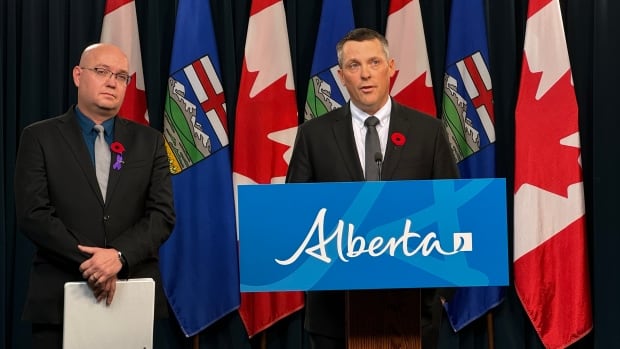
Smaller benefit hikes coming for hundreds of thousands of Albertans relying on provincial programs
CBC
A new bill would put default limits on annual increases to the benefit payments many lower-income and disabled Albertans rely on to cover basic costs.
If passed, Bill 32, the Financial Statutes Amendment Act, would see increases to benefits in programs like the seniors' benefit capped at two per cent per year at most. Hundreds of thousands of Albertans rely on such benefits to cover food and shelter.
Alberta Finance Minister Nate Horner says the bill would also give cabinet the option of boosting benefits by more than two per cent in a given year, if the ministers wish.
"It gives government the discretion to maybe use this as a tool. If you were in a crisis situation, maybe it's more efficient to provide relief in this regard than it is to, say, have affordability payments," Horner told reporters at an embargoed news conference on Monday.
Horner said cabinet will review indexation of benefits and income tax brackets every autumn to set the appropriate rate. Cabinet could consider boosting benefit amounts if government coffers are in better shape than Albertans' pocketbooks, he said.
Horner said the 2025 indexation rate will be two per cent, which will cost the treasury an extra $200 million.
If the rate of inflation is lower than two per cent in the prior calendar year, the default indexation would be tied to the consumer price index instead.
Indexing tax brackets — which allows citizens to earn more money at a lower tax rate — and benefit programs has been a political football for years in Alberta.
In 2018, the NDP government linked benefit hikes to the cost of living. In 2019, when the UCP government took power, premier Jason Kenney de-indexed benefits and tax brackets, saying the province couldn't afford it.
In 2023, in the face of surging inflation, Danielle Smith's UCP government re-indexed the benefits and brackets, giving a six-per-cent boost to benefits that year, followed by a roughly four per cent bump in 2024.
There are nine benefits affected by the indexation decision, including Assured Income for the Severely Handicapped (AISH), income supports for people who do not, or cannot, work, and the Alberta Child and Family Benefit.
If passed, Bill 32 would also enable provincially regulated financial institutions, such as credit unions and ATB Financial, to offer "alternative finance mortgages," such as halal lending.
Islam forbids paying interest on borrowed money. Horner said the changes would allow banks to offer products that use alternative approaches, such as a rent-to-own arrangement, that is permitted by the Muslim faith.
If passed, the law would make Alberta the first province to allow such mortgages under provincial regulation. Government officials said the changes are not limited to halal mortgages and could allow products tailored to people of other faiths.





















 Run 3 Space | Play Space Running Game
Run 3 Space | Play Space Running Game Traffic Jam 3D | Online Racing Game
Traffic Jam 3D | Online Racing Game Duck Hunt | Play Old Classic Game
Duck Hunt | Play Old Classic Game